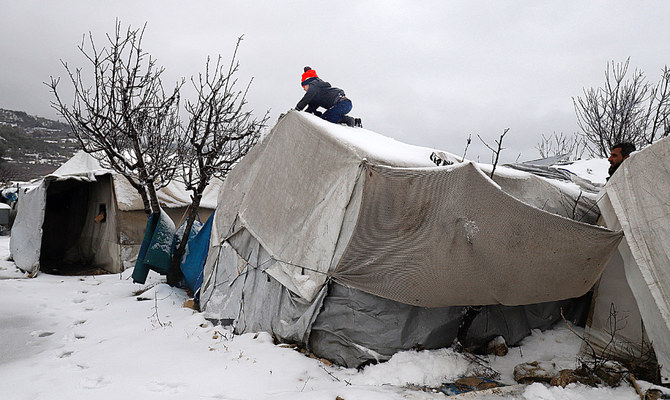AMMAN: A crowdfunding campaign initiated by Palestinian activist Ibrahim Khalil from Nazareth has raised enough money to build hundreds of houses for internally displaced Syrian refugees.
The success of the campaign was due to its use of technology and social media, showing real-time proof that the funds were reaching their targets, and also appears to have been the fact that it touched a nerve with Palestinians who had suffered in tents for years.
Every contribution was publicly listed on social media, and contributors were able to follow the money until it reached the target group.
The campaign, which called for exchanging “tents with houses,” initially attracted support from Palestinians in the West Bank as well as Palestinian citizens of Israel.
The Palestinian Shufat refugee camp outside the old city of Jerusalem donated $300,000.
The following day another Jerusalem neighborhood, Sur Baher, made a substantial contribution and from there the hashtag “houses instead of tents” went viral.
Khalil said the idea had started a month earlier when collecting donations for heaters, according to media reports.
"We began with a specific campaign to purchase and deliver 55 gas heaters,” Khalil said, adding he made sure that the targeted families in the Turki On refugee camp received the heaters and were filmed keeping warm with the new contributions.
But it was a video of Zeina, an 11-year-old Syrian refugee who was living with her grandparents in a tent in northern Syria after both of her parents were killed, that touched an emotional nerve with the activist.
“When I saw Zeina saying she wishes they could live in a house instead of a tent, I remembered how the Syrian people had given support to Palestinian refugees and I decided to move to a much bigger fundraising goal,” said Khalil.
His strategy was to build 273 homes for the Syrian refugees in the north of their country.
“I wanted the fundraising campaign to be specific and tangible. I suggested that anyone who wanted to contribute must contribute something specific. Either an entire house or a bulk number of heaters for the camp.”
Within a few hours, Khalil was able to raise enough money to build 55 homes and a single contributor agreed to provide heaters to 250 families.
Money was passed through well-known and established charities.
Hamada Hamada, a Palestinian activist in Gaza, told Arab News that genuine contributors were often those with the least.
“Never expect money to come from the rich. The poor who have endured and suffered are often the first to contribute as much as they can to help the needy. Palestinians who lived in tents as a result of the 1948 Nakba (The Catastrophe) know very well what it means to live in a tent during the cold months and it is no surprise that they were among the first to contribute to this needy project.”
Lina Shkeir, who works with the Hathi Hayati voluntary group in Jordan, told Arab News that she had been working for some time to try and build 200 homes in the north Syrian area.
“We have already raised enough money to build 50 homes in the village of Al-Hayat and our target is to be able to build 200 homes in that village,” Shkeir said, adding that each home cost $2,200.
Contributions initially begun by Khalil reached $3 million.
In addition to covering the cost of 273 homes in the Turki On camp, another 275 in the Wadi Al-Akhdar refugee camp was covered by the added contributions, he said.
The campaign attracted media and other philanthropic attention precisely because grassroots crowdfunding came from Palestinians who were themselves suffering.
A report from US charity World Vision said 6.8 million Syrians were refugees and asylum seekers, and that another 6.7 million people were displaced within Syria.
“This means 13.5 million Syrians in total are forcibly displaced, more than half of the country’s population. Nearly 11.1 million people in Syria need humanitarian assistance,” it said in its most recent report.
Most of the refugees in the north of Syria had been living in the Idlib area before having to leave due to fighting.
The refugee camps in the area closest to Turkey are under the control of the Syrian opposition.























